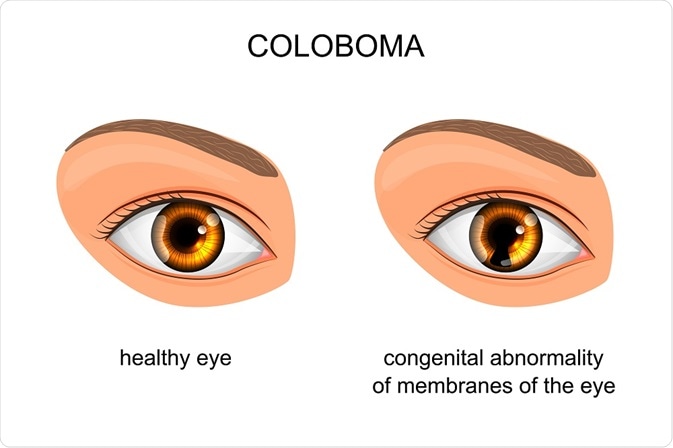Coloboma is a congenital defect that affects the normal structure of the eye, most commonly the eyelid or the iris, causing an absence of part of the eye tissue. It usually affects the upper eyelid and varies from a small notch to a more severe defect of near-total eyelid absence.
 Artemida-psy | Shutterstock
Artemida-psy | ShutterstockColoboma can be inherited or can result from a random genetic mutation, as a stand-alone defect, or as part of a number of genetic disorders which affect other organs as well (as in the CHARGE syndrome). Environmental factors may also be of significance in the development of this condition.
What causes coloboma?
Coloboma is a congenital defect that occurs when the ectodermal optic vesicle fissure does not close normally in the embryo at 5 to 6 weeks gestation. It can be an isolated defect, but it very often presents itself as part of a larger syndrome that affects multiple organs.
To date, over 70 different conditions have been identified in association with coloboma. Examples include the Goldenhar syndrome, CHARGE syndrome, and the Treacher-Collins syndrome.
What are the symptoms?
Coloboma can affect one or both eyes. When present bilaterally, symptoms can vary in severity. The affected parts of the eye may include the eyelid (usually upper), lens, macula, optic nerve, uvea (the middle layer of the eye which includes the iris), retina, and choroid.
Depending on the part of the eye affected and the severity of the syndrome, coloboma can result in mild defects (mostly cosmetic) that do not affect the daily life of the patient, but it can also cause severe complications, including complete loss of vision.
In the case of an iris coloboma, the changes will usually occur in the inferonasal quadrant of the eye – the bottom inner quadrant of the eye. This will present itself in a “keyhole” pupil in the case of a complete defect, and an oval pupil if the defect is partial. Apart from cosmetic defects, it can also cause photophobia due to an abnormally large amount of light entering the eye through an enlarged pupil.
Chorioretinal coloboma is also most commonly seen in the inferonasal quadrant but can extend to affect the optic nerve as well. Where the optic nerve is affected, this can result in partial or complete loss of vision in one or both eyes.
Where coloboma is part of a syndrome or association that affects other organs, symptoms typical of that malfunction will be present. For example, in the Treacher-Collins syndrome, coloboma usually affects the lower eyelid and is accompanied by a slanted appearance of the eye, depressed cheeks, and other features of facial dysmorphia.
Coloboma diagnosis and treatment
Because symptoms manifest from early childhood, coloboma is diagnosed early in development. An ophthalmologist can perform an eye examination to confirm which parts of the eye are affected.
Treatment will vary depending on the part of the eye involved, the severity of the defect, as well as the presence of other defects as part of a genetically inherited syndrome. If coloboma affects central vision, this will influence the child’s ability to read, write, and recognize facial expressions. There is presently no surgical treatment available for coloboma. However, some options for artificial iris implants are possible in the case where coloboma only affects the iris, though rare. It is advised to seek early support for visually impaired children.
Other options that aid in living with coloboma include the use of blue light blocking filters (for patients who are hypersensitive to light), prosthetic contact lenses, and psychological support.
Further Reading
Last Updated: Jul 18, 2023